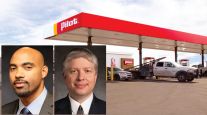Judge OKs $84.9 Mln. Payout in Pilot Class-Action Lawsuit
This story appears in the Dec. 2 print edition of Transport Topics.
A federal judge in Arkansas last week approved an $84.9 million settlement offer from Pilot Flying J to reimburse as many as 5,500 customers who are part of a class-action lawsuit alleging that the truck-stop chain fraudulently shortchanged them on diesel fuel rebates.
The updated settlement payout includes more than $66 million in principal and interest for Pilot customers who alleged they were defrauded dating to 2005 and an estimated $14 million for the attorneys who have represented them in the lawsuit and settlement negotiations.
The total also includes more than $4.5 million for a team of accountants who worked “on average” 70 hours a week to audit 7,000 Pilot customer accounts, the company said.
Cost estimates of the total settlement increased considerably since the deal was first announced in July, largely from millions of dollars in interest.
“It’s a huge tribute to a good judge, good lawyers and a client that was committed to do the right thing,” Aubrey Harwell, a Nashville, Tenn., attorney representing Pilot, told Transport Topics.
Don Barrett, the Lexington, Miss., lead attorney for the plaintiffs who were the original litigants in the class action, did not return a phone message seeking comment. In the past, Barrett has called the settlement “a spectacular result for the class.”
The settlement was reached about three months after a federal investigation into fraudulent diesel fuel rebates became public. In April, FBI agents raided the company’s Knoxville, Tenn., headquarters. Since the raid, seven Pilot executives have pleaded guilty to engaging in fraudulent rebate schemes.
Pilot CEO Jimmy Haslam, who also owns the National Football League’s Cleveland Browns, has said he had no knowledge of the rebate fraud and has vowed to pay back customers every penny they were shortchanged.
The court gave preliminary approval of the settlement in July, only days after all the parties agreed to it.
U.S. District Judge James Moody granted final approval at a public hearing Nov. 25 in Little Rock, saying it met the legal requirement of being “fair, reasonable and adequate.”
“The settlement is fair, in light of the substantial risk and burden on the plaintiffs, had they been forced to litigate the case,” Pilot said in a statement after the Nov. 25 hearing. “The negotiated settlement provides compensation to the class members promptly, and with the oversight of the independent accountant and the court.”
The settlement calls for the checks to be mailed to the shortchanged customers within 30 days after the auditors calculate the precise amount owed.
The customers also will have the right to seek an audit of the calculations by a court-appointed independent auditor if they disagree with the amount. If they are dissatisfied with the auditor’s findings, class members can hire their own accountants to audit their accounts and then ask the court to rule on any disputed amounts.
The settlement, however, does not end the legal battles for Pilot.
The company said that, as of Nov. 22, there had only been 146 “opt-outs” from the settlement, but treating affiliated companies as a single entity reduces the effective number to 60.
However, about 20 state and federal lawsuits remain to be litigated. The company hopes to settle some of those remaining lawsuits, Harwell said.
“If people are reasonable, we’ll be reasonable and get them settled,” he said. “If they’re not reasonable, then we’ll try them” in court.
Drew McElroy, an attorney representing eight Pilot customers in five separatelawsuits, said last week that he was happy for those litigants who will see at least some of the money they wereshortchanged.
However, McElroy, of Knox-ville, Tenn., said the settlement should have included punitive legal damages, which he will seek for his clients.
“I’m sure that there were many trucking companies that had been starved to the brink of submission,” McElroy told TT, “but I have hopes of getting our clients their full measure of compensation. We just don’t think breaking even with peace is a good deal.
“I guess that’s the beauty of litigation. We don’t have to take what they’ll give.”
In July, attorneys involved in the class-action settlement estimated it would cost Pilot about $30 million. However, that total reached $84.9 million last week, according to court documents.
Harwell said the overall numbers increased, in part, because of the nature of the “ongoing process” of auditing.
A number of factors increased the cost of the settlement, including nearly $10 million in interest on the $56.5 million principal to be paid to customers.
Although the interest rate was 6% on the principal, the effective rate of interest was about 17% because the payback principal was for transactions sometimes dating back nearly eight years, Harwell said.



